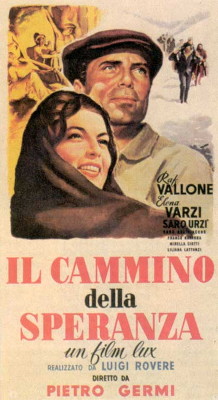| Path of Hope | |
|---|---|
 | |
| Directed by | Pietro Germi |
| Written by | Pietro Germi Federico Fellini Tullio Pinelli Luciano Vincenzoni |
| Produced by | Luigi Rovere |
| Starring | Raf Vallone Saro Urzì Elena Varzi |
| Cinematography | Leonida Barboni |
| Edited by | Rolando Benedetti |
| Distributed by | Lux Film |
Release date |
|
Running time | 100 minutes |
| Country | Italy |
| Language | Italian |
Path of Hope (Italian : Il cammino della speranza) is a 1950 Italian language drama film directed by Pietro Germi that belongs to the Italian neorealism film movement. It is based on Nino Di Maria's novel Cuori negli abissi. Federico Fellini co-wrote the script. In July 2021, the film was shown in the Cannes Classics section at the 2021 Cannes Film Festival. [1]
Contents
In 2008, the film was included on the Italian Ministry of Cultural Heritage’s 100 Italian films to be saved, a list of 100 films that "have changed the collective memory of the country between 1942 and 1978." [2]